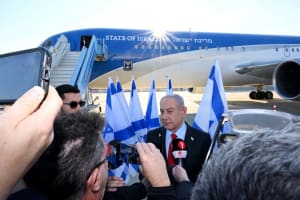'A good day for freedom' – Former IDF spokesman explains impact of Nasrallah's death on Israel
Lt. Col. (Ret.) Jonathan Conricus speaks with ALL ISRAEL NEWS Editor-in-Chief Joel Rosenberg on an "Inside The Epicenter" podcast

ALL ISRAEL NEWS Editor-in-Chief Joel Rosenberg was joined by former IDF international spokesman, Lt. Col. (Ret.) Jonathan Conricus, on an "Inside The Epicenter" podcast shortly after the death of top Hezbollah leader, Hassan Nasrallah, in an Israeli airstrike. During their discussion, they spoke about the significance of the event.
“It's a good day for freedom, for Israel, for democracy. It's a bad day for terrorists and the entire Iranian network,” said Conricus. “I think they're having a few chills down their spines, and it's not a good day for them because the most important non-Iranian figure has been eliminated. Hassan Nasrallah was the chairman, the secretary-general of Hezbollah since 1992. He commanded tremendous influence on the Arab street and amongst other Iranian terrorist organizations all over the Middle East.”
Highlighting the importance of Nasrallah's assassination, Conricus compared it to the elimination of Iranian general Qassem Soleimani under then-U.S. President Donald Trump, explaining that Nasrallah rose to even larger prominence within the Iranian axis of evil.
“It's really a blow for the Iranian axis, and it's really a step in the right direction for the US, for Israel, and the other countries in the region who are looking to expand stability and prosperity and peace and to fight against terrorists,” he said.
“It really is speaking to the tremendous precision of Israeli intelligence and air strikes,” Rosenberg stated, noting that Israel’s intelligence credibility had taken a hit after the failures to prevent the Oct. 7 Hamas invasion and attack last year.
“One of the things the themes that – of yours and my conversations – over the last few months is the extraordinary intelligence coups, the very precise intelligence that has led to a series of Israeli assassinations of the head of Hamas, the number two leader of Hezbollah in Beirut, Fuad Shukr, the top military commander of Hamas in the Gaza Strip, Mohammed Deif. And now the most important, as you say, non-Iranian terrorist in the world, which is Sheikh Hassan Nasrallah.”
"Just to put things into perspective, Israel in the last two weeks has eliminated far more wanted US terrorists than the U.S. has done in 20 years,” Conricus pointed out, naming Shukr, Nasrallah, Ali Karaki, and a few other terrorists, all of whom had American blood on their hands. “They had American, Israeli, Lebanese, French, and other nationalities blood on their hands. So it's really good riddance, not only for Israel and for the region, but really on a global scale.”
Even though Hezbollah is a well-equipped, trained, and dangerous military organization, Conricus said the terror group has been completely penetrated by Israeli intelligence.
“Israel keeps on attacking them and decimating their leadership and stripping away their military capabilities,” he said. “That doesn't come out of nowhere, and it's not something that Israel has scrambled to achieve right now. It's something that Israel has been working for years on in order to carefully map their strategic locations where they're hiding weapons under houses and inside houses.”
Conricus continued: “It's to map their communication systems, their logistics system, their command and control, their secret hideouts, in Beirut, under buildings, in the Bekaa Valley, and in other locations. And all of this has been monitored by the IDF and Mossad, and it's been ready for execution. And once the political echelon, the elected leaders of Israel, gave the military the go ahead, the execution was swift, and I would say almost perfect. Now just to make sure, Israel dropped an unprecedented amount of ordinance on the location where Hassan Nasrallah and the other chief terrorists were. We're talking about 83 bombs, each one of them weighing almost a ton.”
Rosenberg spoke about the shock felt across the Arab world following the attack.
“I think this has caught all of the Iranian regime and certainly all of the people that are left inside Hezbollah in shock.” He noted that they hadn’t even yet talked about the extraordinary Mossad operation to wire all of some 4000 or so pagers used by Hezbollah with explosives.
“We're talking about a level of sophistication and creativity and precision that I think is unmatched in Israeli history in terms of this magnitude.”
Rosenberg told Conricus that the shock was not restricted to the Middle East, but that the world has been caught off guard by Israel’s recent moves against Hezbollah.
“We were very badly shaken by October 7th and our failures, but something is really happening in recent days and weeks that is actually shocking everybody, even people who are pro-Israel.”
As positive and successful as recent Israeli operations have been, Conricus brought some of the harder realities of the current situation back into focus.
“I am dampened in terms of my enthusiasm because we still have 101 Israeli hostages in Hamas captivity, and about 70,000 Israelis that have been forced away from their homes, and they still haven't been able to return. So what Israel has done by eliminating Hassan Nasrallah, hopefully, will lead to the correct strategic situation that would allow Israelis to go back to their home safely without the threat of Hezbollah on the border. And, hopefully, in the more distant combination of events, maybe it will also lead to a hostage deal with Hamas and the return of the hostages.”
“Well, that would be great,” agreed Rosenberg. “A huge answer.”
Click here to listen to the full podcast.

The All Israel News Staff is a team of journalists in Israel.













